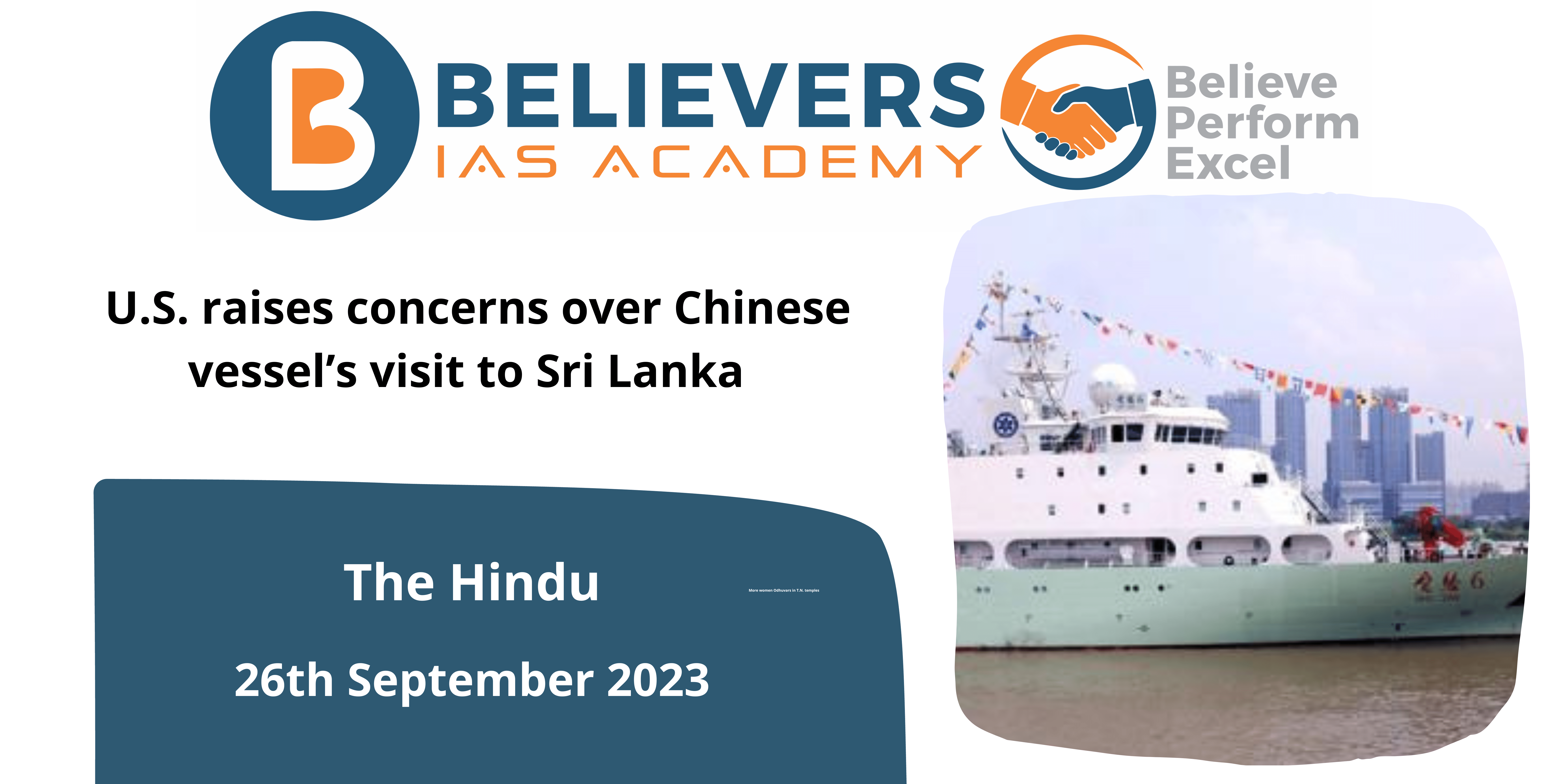U.S. raises concerns over Chinese vessel’s visit to Sri Lanka
Context
According to Colombo-based media, the United States has expressed alarm to the Ranil Wickremesinghe administration about the planned arrival of a Chinese research vessel to Sri Lanka in October, following India.
What is the background on the tensions in the Srilankan waters?
Yuan Wang 5 Visit to Hambantota Port:
- Yuan Wang 5, a Chinese satellite tracking ship used for space operations and satellite launches, is visiting Hambantota Port.
- Concerns and diplomatic tensions between India, Sri Lanka, and China arose as a result of the ship’s landing at Sri Lanka’s Hambantota Port.
- India and the United States both raised concern about the visit.
- The visit went through as scheduled despite reservations, sparking diplomatic debates and worries about China’s growing military might and regional influence.
- During this tour, Sri Lanka had to negotiate diplomatic ties with both China and India.
Hai Yang 24 Hao’s visit to the port of Colombo:
- Warship Hai Yang 24 Hao is a Warship of the Chinese People’s Liberation Army Navy.
- , the warship paid an official visit to Sri Lanka’s Colombo Port.
- The anniversary of a previous Chinese vessel’s visit, which had caused diplomatic issues between India and Sri Lanka, and this voyage’s timetable fell on the same day.
- Sri Lanka stressed that it adhered to its standard procedure for receiving consent from several government entities for foreign vessel visits.
Which is the latest chinese vessel that is going to dock in Srilankan Port?
- Chinese Research Vessel Visit: The scheduled visit of the Chinese research vessel Shi Yan 6 to Sri Lanka in October is the primary cause of concern.
- The Shi Yan 6 is a Chinese research and survey vessel that was built in 2020.
- It is 17 meters in width and 90.6 meters in length, and it can carry 1115 t DWT.
- On October 25, the Shi Yan 6, which is now on an 80-day exploratory mission, is anticipated to arrive in Sri Lanka.
- For 17 days, the ship will stop at the ports of Colombo and Hambantota in Sri Lanka.
- The 60-person crew of the Shi Yan 6 conducts research in marine geology and oceanography. The ship is reportedly on a “expeditionary voyage” in the eastern Indian Ocean, according to China. Concerns over the ship’s visit to Sri Lanka have been voiced by the United States and India.
What are the concerns raised by the USA?
- Security consequences: Concerns that Chinese research vessels’ presence, particularly in sensitive locations, may have security consequences and might be related to military or intelligence collection operations.
- Strategic Interests: There are worries that the United States’ strategic interests in the region, particularly upholding stability and security, may be threatened by China’s expanding presence and influence in the Indian Ocean.
- Regional Balance:Maintaining a balance of power in the region may be important to the United States in order to prevent any one nation from wielding disproportionate influence.
- Alliances and Partnerships: The United States has alliances and partnerships in the region, particularly those with India. As a result, it may be concerned about how Chinese actions might impact these connections.
- Freedom of Navigation: The security of sea lanes and the freedom of navigation in international waters are important U.S. interests. Any actions that would violate these tenets might be cause for concern.
- Transparency and Compliance: The United States may push for openness and conformity to global standards in marine activity, such as visits by research vessels
What are the concerns raised by India?
- Security Consequences: Given the arrival of the Chinese research vessel, India is probably worried about potential security consequences. They might be concerned that the vessel’s operations include military or intelligence gathering elements that could compromise India’s national security.
- Strategic Importance:India seeks to uphold stability and security in its maritime area and has strategic interests in the Indian Ocean region. Concerns about regional balance and influence can arise from the presence of foreign vessels, particularly those from a significant regional rival like China.
- Territorial Integrity and Sovereignty: India may stress the significance of Sri Lanka’s territorial integrity and sovereign status. They would want guarantees that Sri Lanka won’t allow actions on its soil that jeopardize India’s security.
- Alliance with Sri Lanka: In terms of both security and economic links, India and Sri Lanka have a major partnership. Any conduct that would jeopardize this alliance or jeopardize India’s interests in Sri Lanka would be of concern.
- Freedom of Navigation: India, like the US, is dedicated to upholding the right to freely navigate in international waters and defending important shipping corridors. Any behaviors that might violate these rules ought to be avoided.
What is the way forward from these tense situations?
- Open Communication and Transparency:
- Open channels of communication and transparency should be maintained by all parties to ensure rapid resolution of any issues or misconceptions.
- To avoid rumours and reduce the likelihood of miscommunication, Sri Lanka should keep sharing the reason for and specifics of such trips in a transparent manner.
- Diplomatic Engagement:
- To address any potential issues brought up by such visits and identify common ground, India and China should participate in diplomatic conversations.
- Sri Lanka ought to take the initiative in promoting understanding and diplomatic communication between the two countries.
- Observing Sovereignty:
- All parties should respect Sri Lanka’s sovereignty and its right to independently decide on its international relations and visits.
- China and India must respect Sri Lanka’s choices and make sure that their objectives line up with the country’s overall objectives




